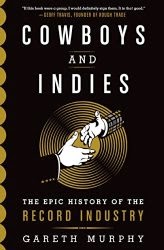“If history repeats itself, and the unexpected always happens, how incapable must Man be of learning from experience.” – George Bernard Shaw
Those who deride, denounce, and generally decry the new music business world of streaming and single downloads should know we’ve been here before. I won’t go into 45 “singles”, and in fact this particular story predates even those years by almost 70 years.
 In the book “Cowboys and Indies: The Epic History of the Record Industry”, by Gareth Murphy, he tells an early story of the first (and only) recording industry monopoly. Around 1895, business tycoon Jesse Lippincott bought into Thomas Edison’s phonograph (at that time the prevailing “talking machine” technology was still a wax cylinder machine.) He exclusively licensed the technology across the nation to dealers who in turn leased the machines to users. His partner in this business was Edward Easton, the industry’s first record producer, and the grandfather of Columbia Records.
In the book “Cowboys and Indies: The Epic History of the Record Industry”, by Gareth Murphy, he tells an early story of the first (and only) recording industry monopoly. Around 1895, business tycoon Jesse Lippincott bought into Thomas Edison’s phonograph (at that time the prevailing “talking machine” technology was still a wax cylinder machine.) He exclusively licensed the technology across the nation to dealers who in turn leased the machines to users. His partner in this business was Edward Easton, the industry’s first record producer, and the grandfather of Columbia Records.
“Despite a moderately promising start, Lippincott’s company and all of its affiliated distributors began hemorrhaging money. Wisely, Edward Easton went out to investigate what was happening on the ground. Throughout March 1890, in what would be the first nationwide study of the nascent record industry, Easton traveled coast to coast, visiting thirty-one of Lippincott’s regional branches. To his amazement, Easton observed something nobody saw coming. A San Francisco distributor had transformed the phonograph into “pay to play” jukeboxes. Custom-built, in beautifully decorated wooden cases and fitted with coin slots, they were placed in arcades, saloons, drugstores, and various strategic places of passage. The fashion spread from California to other cities. Although the average take for most of these nickel phonographs was about $50 a week, the most popular jukebox was believed to be in a drugstore in New Orleans. It averaged $500 a month. Within a year, Lippincott’s monopoly began to collapse.” – Gareth Murphy, Cowboys and Indies
It would seem throughout music history, consumers choose to pay for one song as they want it. I’m sure if they could have come into a music hall and demanded orchestras play just the piece they wanted, they would have.
WHY THIS MATTERS:
The plain truth that all current musicians have to live with now is that we are moving away from recorded music in general as a commodity. Until the late 1880’s the only way to even experience music on demand outside a music event was playing from sheet music, and that had only flourished since the widespread availability of the printing press. Now, technology has freed music from such primitive constructs as cylinders, wax discs, tapes, and even digital discs. Music is everywhere, on every portable player, phone, tablet, laptop, and other device. It’s even available over the air in every restaurant or store, or on music channels in our cable package.
Just as jukeboxes transformed the first early record business, Spotify, Pandora, iTunes, Beats, Rhapsody, and others offer users the ability to hear any song any time, and it is rocking the recording business just like it did 150 years ago in it’s infancy.
It’s just music history, repeating.
—
John Eric Copeland isn’t a real musicologist but plays one on the Internet. Be sure to sign up to get this blog when it posts, and join us on Facebook, Twitter, and LinkenIn for daily tidbits.